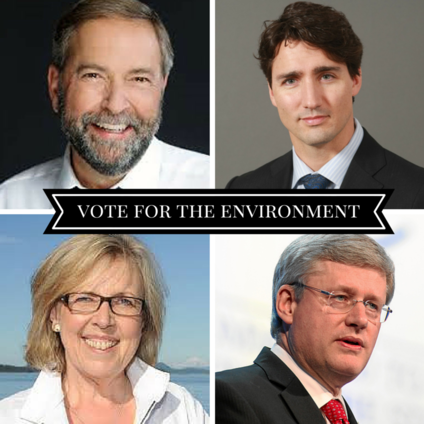
There’s an election going on. But did you notice almost none of the candidates are talking about the environment? I have, but I can’t say I’m surprised. Politicians and the media just love to focus on the economy at voting time.
If I had my way, the candidates would be answering four critical questions at every door they knock on between now and October 19th. My questions are about the economy, but more importantly, they are also questions about what supports the economy – our environment.
It would be great if you would join me in asking candidates the following questions and sending us the responses so we can follow-up after the election
1. Will you reform the pesticide approval system in Canada?
As you know, bees and pollinators around the world are being decimated by pesticides. The global economic cost of bee decline, including lower crop yields and increased production costs, has been estimated to be as high as $5.7 billion per year. I feel like I’ve been stung because we have heard nothing about the bees during this election campaign. Yet, last year, over 100,000 people participated in our stop flupyradifurone campaign.
The problem, however, is bigger than the bees and pollinators. Canada’s Pest Management Agency goes merrily along approving new pesticide after new pesticide. The industry has a lot of clout, it’s true, but fundamentally it is the dated approach to assessing pesticides that has us chasing one pesticide at a time. Instead, we need to be looking at their syngergistics effects and impacts on ecosystems. We need the future government to update the outmoded pesticide assessment model used by the PMRA.
2. Precisely how will you put democracy and science back into environmental assessments and environmental protection?
In 2012, the government rewrote the Environmental Assessment Act, the Navigable Waters Act, and the Fisheries Act. All of these changes were designed to limit the scientific and public consideration of natural resource projects. The two immediate results were the dropping of about 6000 federal environmental assessments and limiting public participation to those with a “direct” interest.
Some parties say they will fix our broken assessment system, but where are the details? Will you and I have our right to participate reinstated? Will all of the climate change implications of projects be considered?
Environment and economy cannot be separated. They are two sides of one coin. Democracy and science are needed to guide us to undertake the environmental protection that is required for a sustainable economy.
3. How will you cap all greenhouse gas emissions?
All of the parties are saying they will control greenhouse gas emissions. What isn’t clear is how. The Intergovernmental Panel on Climate Change says we absolutely must limit the increase in average global temperatures to below 2 degrees Celsius. This means we must phase out fossil fuels by mid-century. How do we do that? By building pipelines? Expanding oil sands production and fracking for oil and natural gas?
Some parties advocate for a carbon tax, others for cap and trade. Some say the status quo is just fine. We know that the cost of early action on climate change is far outweighed by the cost of not acting, especially if we are to minimize the social and economic costs. So, where are the comprehensive plans to phase-out fossil fuels to meet the scope and scale of the challenge?
I think after 25 years of debate we are entitled to details. Don’t you?
4. How will you protect Canada’s Pacific Coast, Atlantic Coast, and Arctic waters, from dangerous oil tanker traffic and risks of offshore oil drilling?
The federal government says it has “world class” regulations, but it lets the companies that drill off the Atlantic coast store their blowout capping safety equipment in Europe, and it is actually relaxing the safety requirements for drilling in the Arctic.
Why are they doing this? Well, maybe it is to make the costs of business lower for the oil companies. The cost of drilling one well in the Arctic is about $500 million, which coupled with low oil prices is a problem for their business model. However, with the risk of a major oil spill in the range of 75% and oil spills being essentially uncleanable, drilling is a huge risk for the Arctic environment.
So, this is a trick question, because there is only one right answer: Don’t drill in dangerous areas. To phase out fossil fuels, we must first stop searching for them in expensive, risky places.
What answers will we get from the candidates knocking on our doors?
When the election is over, Sierra Club Canada Foundation will be gearing up to pursue a truly sustainable agenda. We are looking to you to participate in our work leading up to the election and after the ballots have been counted.
John Bennett
National Spokesperson
jb@sierraclub.ca • (613) 241-4611
One Earth • One Chance
Like us on Facebook / Find us on Twitter @sierraclubcan

